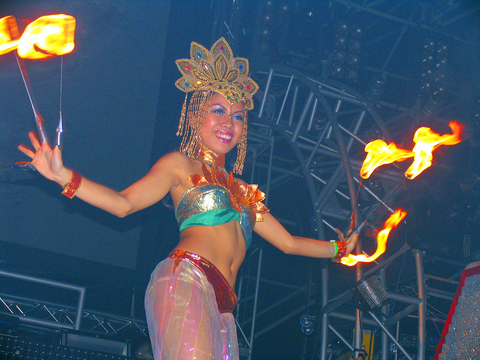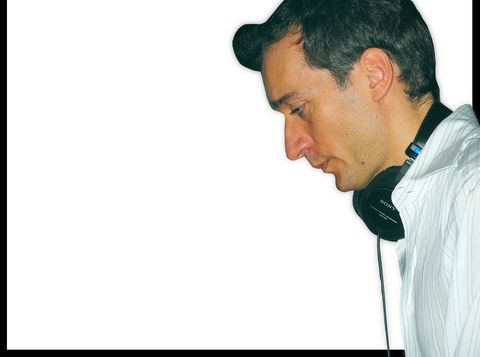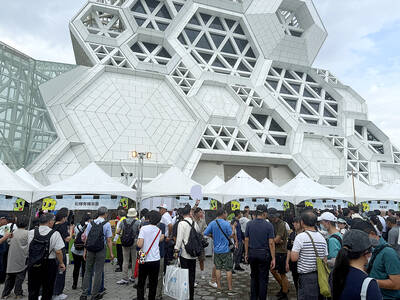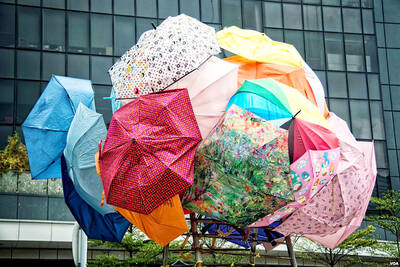The world's most popular DJ is Paul van Dyk and he showed Taipei why with a fierce set of techno-trance music that had the city's bright young things transfixed by the beat until five in the morning.
He played until everyone was satisfied and the DJ box was decked in flowers presented by impressed fans.
Wearing a simple, white, pressed shirt with slacks and looking smooth, Van Dyk set aside the inevitable tiredness of a world tour to promote his latest album Politics of Dancing 2.

PHOTOS: JULES QUARTLY, TAIPEI TIMES
The irritation of a delayed flight meant he only had time to quickly check in at the Grand Hyatt Hotel before being driven to the show at around 1am.
An hour previously the queue outside the venue had a view of the world's tallest building, which provided some distraction for the 3,000 people who were snaking halfway round the Taipei World Trade Center 2 building (
At the entrance security guards had to force the surging crowd back at one point. The atmosphere was charged and a flash point could have set off trouble, but instead people kept their party mood and most managed to get in before 1:30am.

It was a big night for Taipei as smart businessmen and gang leaders insisted on flaunting their connections to jump the queue. Gaggles of their enchanted and enchanting followers trailed in after them.
Loop, the promoter of the event, had spent extra cash on the speakers so the bass rumbled and delivered a huge sound with plenty of roll at low frequency. If more had been paid, perhaps there would not have been times when the bass bins cut out.
Fortunately, there was an entertaining stage show for these lulls -- techno-fetish actors on stilts, dancers, fire spinners -- and Van Dyk used them to rebuild his sound and crash back in again to big cheers when the volume returned. It almost seemed staged, as the DJ pulled the musical strings and brought the crowd up and then let it recharge itself for the next high point.
Since Van Dyk's flight had been delayed there were no interviews, so it was not possible to record what his impressions of Taiwan were, or what car he likes to drive. But looking at his interviews he generally says the same thing. Maybe it's because he mostly gets asked the same questions.
He's 34, from the former East Germany, and lived in Berlin, where he could listen to Western radio stations. His passion for music was ignited by The Smiths and New Order. When the wall came down in 1989 he started playing on the Kreuzberg area techno scene, then moved on to England and now spends a lot of his time in America. He works hard and he doesn't do drugs.
He is top class and plays the tunes middle Europe favors. Most of the voters in the DJ Magazine poll who voted for Van Dyk are from here.
I prefer former number one Tiesto's music, his sense of pace and melody and neat mixes. But right now Van Dyk is putting his rivals in the shade with his almost Wagnerian vibes: his drama and technique.
He writes and produces most of the tracks he plays, but these are tweaked CD singles, or "dub plate" versions, that only he owns. So he can change up his set and respond to a crowd's mood better than anyone else.
As for the Loop promoters, the owners established a relationship with Van Dyk about three years ago when he was invited to play at 2nd Floor.
They too have proved themselves on the world stage and are the natural choice for any big-name DJ rolling into town.
It was a proper rave, on a par with anywhere else in the world.

Water management is one of the most powerful forces shaping modern Taiwan’s landscapes and politics. Many of Taiwan’s township and county boundaries are defined by watersheds. The current course of the mighty Jhuoshuei River (濁水溪) was largely established by Japanese embankment building during the 1918-1923 period. Taoyuan is dotted with ponds constructed by settlers from China during the Qing period. Countless local civic actions have been driven by opposition to water projects. Last week something like 2,600mm of rain fell on southern Taiwan in seven days, peaking at over 2,800mm in Duona (多納) in Kaohsiung’s Maolin District (茂林), according to

It’s Aug. 8, Father’s Day in Taiwan. I asked a Chinese chatbot a simple question: “How is Father’s Day celebrated in Taiwan and China?” The answer was as ideological as it was unexpected. The AI said Taiwan is “a region” (地區) and “a province of China” (中國的省份). It then adopted the collective pronoun “we” to praise the holiday in the voice of the “Chinese government,” saying Father’s Day aligns with “core socialist values” of the “Chinese nation.” The chatbot was DeepSeek, the fastest growing app ever to reach 100 million users (in seven days!) and one of the world’s most advanced and

The latest edition of the Japan-Taiwan Fruit Festival took place in Kaohsiung on July 26 and 27. During the weekend, the dockside in front of the iconic Music Center was full of food stalls, and a stage welcomed performers. After the French-themed festival earlier in the summer, this is another example of Kaohsiung’s efforts to make the city more international. The event was originally initiated by the Japan-Taiwan Exchange Association in 2022. The goal was “to commemorate [the association’s] 50th anniversary and further strengthen the longstanding friendship between Japan and Taiwan,” says Kaohsiung Director-General of International Affairs Chang Yen-ching (張硯卿). “The first two editions

It was Christmas Eve 2024 and 19-year-old Chloe Cheung was lying in bed at home in Leeds when she found out the Chinese authorities had put a bounty on her head. As she scrolled through Instagram looking at festive songs, a stream of messages from old school friends started coming into her phone. Look at the news, they told her. Media outlets across east Asia were reporting that Cheung, who had just finished her A-levels, had been declared a threat to national security by officials in Hong Kong. There was an offer of HK$1m (NT$3.81 million) to anyone who could assist